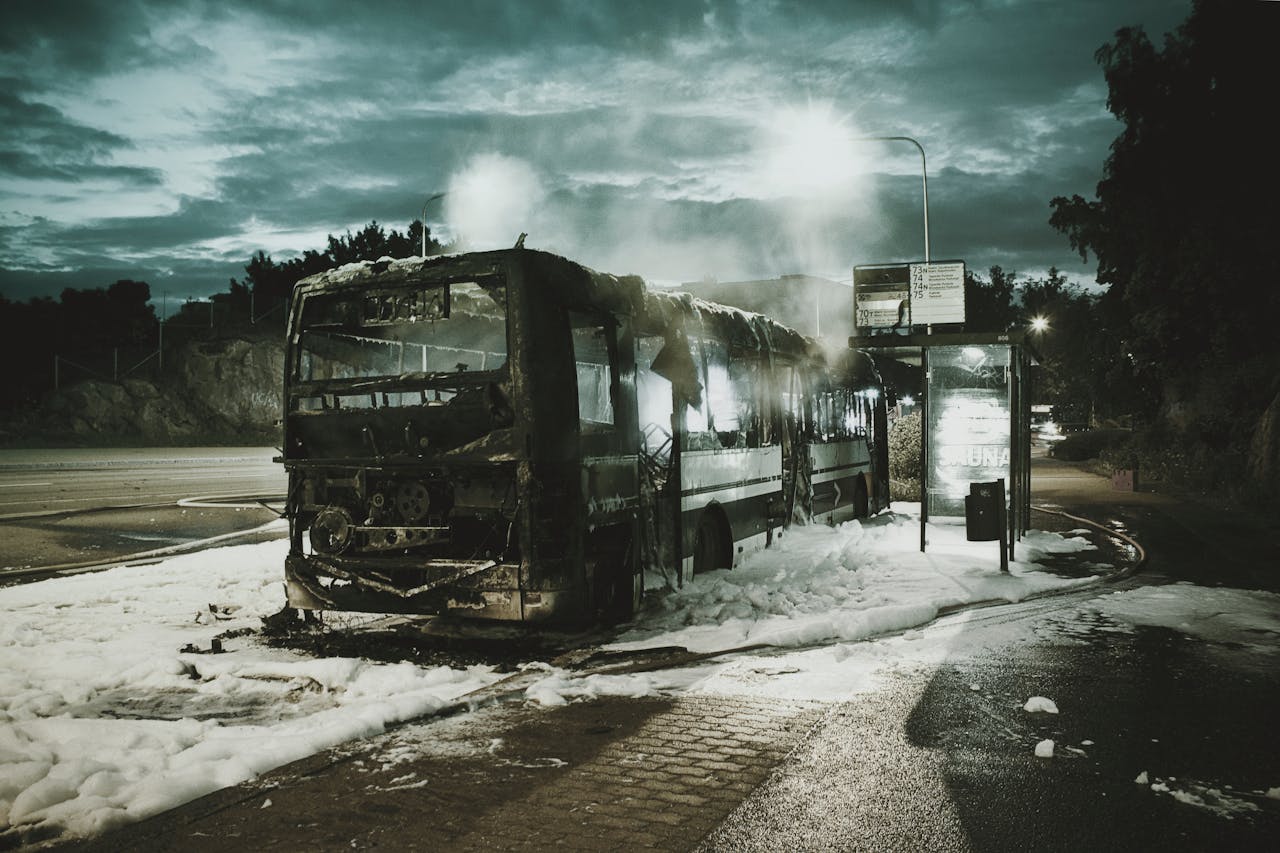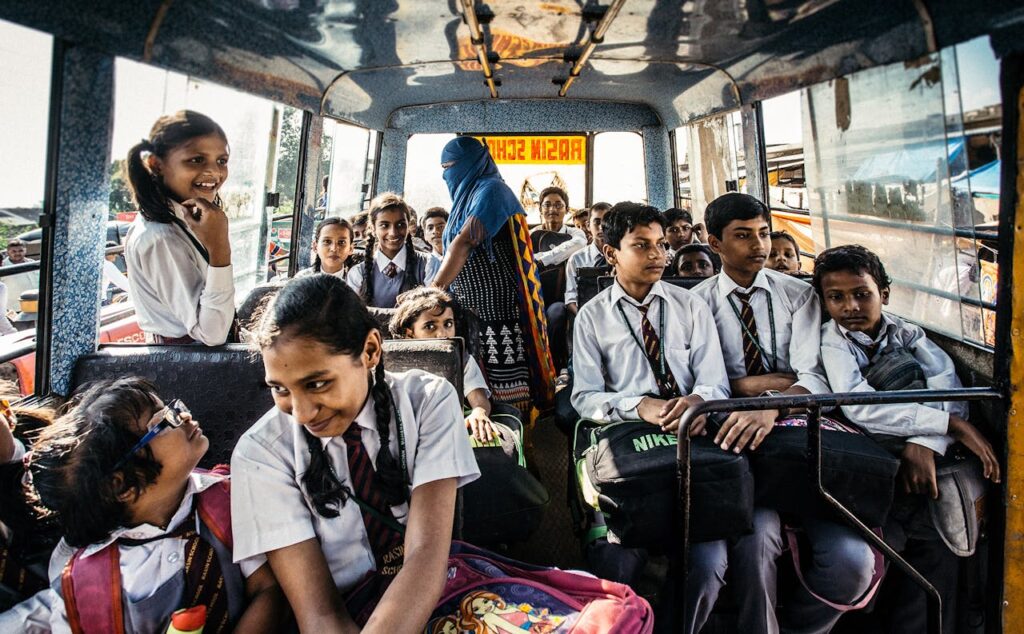Meet Dorian Pace, The Hero Who Saved 15 Children From A Burning School Bus

It was just another school day. A cold February morning in Ohio. Kids laughing, backpacks slung over shoulders, a yellow bus humming its way down familiar streets. Nothing seemed out of the ordinary — until everything was. In the moments that followed, a school bus caught fire. Fifteen children were trapped inside. And one man — Dorian Pace, the driver — had seconds to decide what kind of story this would become.
This isn’t just the story of a man who saved lives. It’s a story about what it means to show up with integrity before anyone’s watching. About the quiet strength of people whose names we rarely know but who carry the weight of others every single day. It’s about heroism — not the kind that seeks attention, but the kind that emerges from character.
I don’t know about you but I could use a feel good story and here it is! God Bless this hero 🙏❤️🙏
— Michelle Maxwell (@MichelleMaxwell) June 19, 2025
32-year-old Aaron Tucker of Bridgeport, Connecticut, was just a week out of jail and had a job interview. So early that morning he grabbed the dress shirt the halfway house had… pic.twitter.com/1HCz6cUIkt
The Calm Before the Fire – A Routine Day Turns Heroic
On a cold February morning in Cleveland Heights, Ohio, Dorian Pace began his day the way he had for the past eleven years — with quiet commitment and a sense of duty. As a school bus driver for the Cleveland Heights-University Heights School District, he doesn’t just drive a route; he’s the first adult many children see before they begin their school day, and the last they see before heading home. Over the years, he’s learned that his job carries more weight than just steering a wheel. It’s about presence. It’s about showing up consistently with kindness, patience, and awareness — qualities that often go unnoticed, until they become critical.
Pace has always taken pride in his role. “I greet my students with a smile every morning,” he shared. “Sometimes, a little kindness changes a child’s whole day.” Those words, simple and unassuming, reflect a deeper truth about the influence of everyday people. That small, consistent act of showing care became the foundation of something much bigger. On February 27, 2024, that quiet consistency turned into a moment of courage that would define him not just as a bus driver, but as a protector in the truest sense of the word.
As he drove his usual morning route with 15 students onboard, something felt off. The bus wasn’t responding the way it should. To someone else, this might have been an inconvenience. But to Pace, whose senses were tuned from years behind the wheel, it was a warning. He radioed for mechanical support, not yet realizing how urgent the situation would become. Then, without much time to react, he heard a loud boom — a deep, echoing noise that broke through the hum of the engine. Glancing into his mirrors, he saw it: smoke pouring from the rear, thick and fast, followed by the unmistakable glow of fire.
What followed wasn’t panic. It wasn’t chaos. It was instinct, sharpened by years of experience and an unwavering commitment to the safety of his passengers. Without raising alarm or fueling fear, Pace quickly ushered the children off the bus, one by one. He kept his composure, guiding them calmly as flames began to engulf the vehicle. In that moment, there was no time to second-guess. Every second counted. And because he acted with clear-headed urgency, all fifteen children escaped unharmed.
But what may be even more striking than his bravery in that moment is what he did afterward. Once firefighters and police officers arrived and confirmed the safety of the students, most would expect him to go home, to take a breath, to process the trauma of what had just occurred. Instead, Pace quietly climbed into another bus and finished his route. No fanfare. No pause. Just the belief that the job still needed doing. “I was still on duty, and I had a job to do,” he said, matter-of-factly.
In that simple statement lies a profound truth. Heroism is not always loud. It’s not always found in headlines or grand gestures. Sometimes, it shows up in the form of a man who sees his work — and the people he serves — as sacred. A man who understands that leadership doesn’t wait for applause. It just does the right thing, especially when it’s hard. On that winter morning, Dorian Pace embodied what it means to be a quiet guardian — steady in crisis, humble in victory, and deeply human through it all.

More Than a Job – The Quiet Integrity of Public Service
Dorian Pace didn’t see himself as a hero. And perhaps that’s what makes his story so powerful. After the flames were extinguished and the children were safe, local parents, colleagues, and media outlets rushed to praise his actions. His family began calling him “hero dad” and “hero husband.” The Cleveland Heights City Council formally honored him. The Ohio Department of Public Safety presented him with a commemorative coin. And the local Board of Education passed a resolution to acknowledge his extraordinary dedication to student safety. Yet through all of this, Pace remained grounded. “I don’t see it that way,” he said, when asked about the recognition. “I was just doing my job, and I’m grateful to God we all got out safely.”
That humility is not a performance. It is a reflection of a deeper value system — one built on service, consistency, and care for others. The job of a school bus driver is rarely glamorous. It doesn’t come with viral fame or big paychecks. But it requires immense responsibility, emotional intelligence, and composure under pressure. Every morning, public service workers like Pace step into roles that shape lives, often without acknowledgment. They learn the patterns and moods of their students. They watch for signs of distress. They are, in many ways, silent sentinels — keeping children safe not just from physical harm, but sometimes from the emotional weight they carry on the way to and from school.
Pace’s story lifts the veil on a truth we often overlook: heroism doesn’t always look like capes or medals. It often looks like showing up — day after day — with care and consistency, even when no one is watching. It looks like someone who knows every name on their route, who can sense when something is off with their vehicle or their passengers, who treats a routine job as a sacred trust. That’s the kind of integrity that cannot be taught in a training manual. It comes from a lifetime of choosing to care, even when it’s inconvenient.
And when the test came — in a sudden burst of smoke and flame — those values didn’t waver. They rose. In a world that often celebrates flash over substance, Dorian Pace’s actions remind us that the people we pass by every day — the bus drivers, cafeteria workers, janitors, crossing guards — are often the ones carrying the quiet courage that keeps our communities running. They are the heartbeat of public life, and their stories deserve to be told not just in moments of crisis, but every day.

Redefining Heroism in a World That Overlooks the Everyday
We live in a world that often equates heroism with spectacle — with cinematic rescues, viral moments, or people in uniforms and badges. But real heroism, the kind that sustains communities, often exists quietly. It doesn’t always make headlines. It doesn’t come with dramatic music or a camera crew. It looks like Dorian Pace, a man who didn’t run toward recognition, but toward responsibility — and in doing so, saved fifteen lives.
The truth is, the most heroic acts are usually rooted in ordinary decisions made under extraordinary pressure. It’s the teacher who stays late for a struggling student, the nurse who works a double shift with compassion, the sanitation worker who clears ice from a sidewalk no one else noticed. These actions don’t demand attention — but they deserve it. They reflect the kind of character that doesn’t need a stage to matter. As American author and historian David McCullough once said, “Real heroes are all around us. They are just ordinary people who step up when it counts.”
Dorian Pace didn’t plan to be a hero that morning. He didn’t wake up expecting flames or headlines. What he did wake up with was a commitment to his job, to the children on his route, and to doing the right thing — no matter what. That’s what makes his story so profoundly human. He didn’t hesitate. He didn’t pause to assess his own safety first. He led. And in doing so, he reminded us that heroism isn’t about being fearless — it’s about choosing courage even when fear is present.
In a society that often overlooks the people who hold it up, we need to expand our definition of greatness. Not everyone who makes a difference wears a suit, holds a microphone, or commands a spotlight. Some wear reflective vests and sit behind the wheel of a yellow school bus. They protect, serve, and shape lives without fanfare. They’re the everyday heroes — and it’s time we start seeing them as such.
Look Closer — The Extraordinary Is All Around Us
Dorian Pace may have saved lives in a single dramatic moment, but the truth is, he was saving something every day — a sense of safety, of routine, of care. His story reminds us that courage isn’t always about a single act. It’s about the thousand unseen decisions that come before it. It’s about the way we show up when no one is watching, how we carry ourselves in the roles we’ve been given, and how seriously we take the responsibility to care for one another.
We are surrounded by people like Dorian. People who go unnoticed until something goes wrong — and even then, they often brush off praise with quiet humility. But what would happen if we didn’t wait for the crisis? What if we recognized the dignity in the everyday? In the custodian who keeps a school clean not just for appearances, but for health and safety. In the transit worker who ensures thousands of strangers get home to their families. In the parent juggling two jobs and still making it to the school recital. These people are not footnotes. They are the backbone.
If this story does anything, let it shift your lens. Look again at the people in your life. The ones who serve, who care, who protect in ways big and small. Let it challenge you, too — not just to admire courage, but to embody it. Because while most of us may never face a burning bus, all of us will face moments where we must decide who we want to be. Will we step up? Will we care enough to act? Will we live like someone is counting on us — even if they never say it?
That’s what Dorian Pace did. And if we carry forward even a fraction of that spirit — in our families, our communities, our work — then we, too, become part of something bigger. We become reminders that heroism lives in everyday people. In people like him. And in people like us.
Loading...

